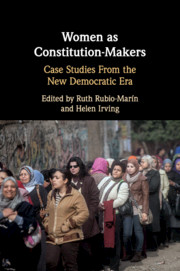Book contents
- Women as Constitution-Makers
- Women as Constitution-Makers
- Copyright page
- Contents
- Notes on Contributors
- Acknowledgements
- Introduction
- 1 Women’s Movements and the Recognition of Gender Equality in the Constitution-Making Process in Morocco and Tunisia (2011–2014)
- 2 Women and Constitution-Making in Post-Communist Romania*
- 3 Re-Living Yesterday’s Battles
- 4 Women’s Participation in Peace-Building and Constitution-Making in Somalia
- 5 Feminist Legalism
- 6 Women and Constitution-Making in Turkey
- 7 Egypt’s Tale of Two Constitutions
- 8 Dialogic Democracy, Feminist Theory and Women’s Participation in Constitution-Making
- Index
- References
8 - Dialogic Democracy, Feminist Theory and Women’s Participation in Constitution-Making
Published online by Cambridge University Press: 25 March 2019
- Women as Constitution-Makers
- Women as Constitution-Makers
- Copyright page
- Contents
- Notes on Contributors
- Acknowledgements
- Introduction
- 1 Women’s Movements and the Recognition of Gender Equality in the Constitution-Making Process in Morocco and Tunisia (2011–2014)
- 2 Women and Constitution-Making in Post-Communist Romania*
- 3 Re-Living Yesterday’s Battles
- 4 Women’s Participation in Peace-Building and Constitution-Making in Somalia
- 5 Feminist Legalism
- 6 Women and Constitution-Making in Turkey
- 7 Egypt’s Tale of Two Constitutions
- 8 Dialogic Democracy, Feminist Theory and Women’s Participation in Constitution-Making
- Index
- References
Summary
- Type
- Chapter
- Information
- Women as Constitution-MakersCase Studies from the New Democratic Era, pp. 351 - 377Publisher: Cambridge University PressPrint publication year: 2019



